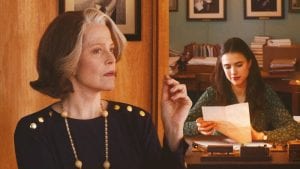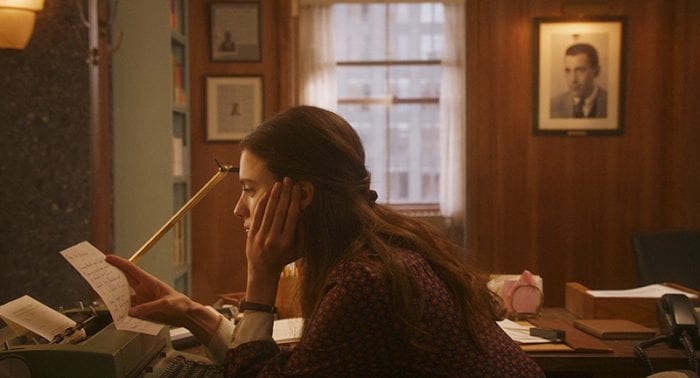Reviewed by Jeffrey Sanzel
Joanna Rakoff’s 2014 memoir My Salinger Year joins The Devil Wears Prada and The Nanny Diaries as veiled paeans to victimhood. In 1996, young Joanna, having just acquired a bachelor’s degree in English, goes to work for a prestigious literary agency. She learns to stand up for herself and moves on, with lessons learned and head held high.

The boss (called the Boss in the book and Margaret in the film) is not a demon on the level of Prada’s Amanda Priestly. Rather, she is an eccentric holdover from an earlier era, maintaining a kingdom locked in the 1950s. Think of her as the Boss from Heck. All employees must use typewriters, with a single computer introduced to track copyright violations. The agency dwells in the world of martini lunches and name-dropping its most prestigious — and mostly dead — clients: Dylan Thomas, F. Scott Fitzgerald, Agatha Christine, and, of course, J.D. Salinger. Salinger is the jewel in the agency’s crown. The organization is responsible for all his literary business and for dealing with the thousands of fan letters that have steadily arrived for decades.
The book emphasizes Joanna’s fears, with the earlier part of the work written in a tightly wound, almost neurotic prose, coming out and fits and starts. As she matures, so does the relating of her story.
Turning a book about the love of books, writing, and writers into a film is challenging. To show the passion for the written word in a cinematic setting has myriad pitfalls. The tone is either lost or shifted. What is often simple and honest is forced to take on a more melodramatic tone.
The film My Salinger Year balances its faith to the source and the need for a more cinematic-friendly narrative. Joanna’s personal life is simplified, focusing on her decision not to return to Berkley to join her long-term boyfriend and to remain in New York. She quickly becomes involved with Don, a wannabe novelist who works part-time in a socialist bookstore. A few years older and a complete narcissist, Don goes from supportive to condescending to emotionally destructive.
Assistants in the literary world believe that they will be reading brilliant manuscripts and use the contacts and opportunity to fulfill their ambitions. In Joanna’s case, she has had two poems published in The Paris Review and has her heart and sights set on The New Yorker.
Much to her chagrin, Joanna is relegated to secretary, transcribing Margaret’s letters from Dictaphone tapes. Joanna is also assigned the form letter — dating from 1963 — that is the only approved answer to any mail sent to Salinger. The letter states that Salinger does not correspond. Eventually, Joanna takes it on herself to respond personally, with varying degrees of success and disaster. In the film, a disgruntled high school girl arrives in person to castigate Joanna. In the book, it is all done via post.

The main action focuses on Salinger wanting to publish one of his old magazine stories, “Hapsworth,” in a stand-alone volume, printed by a small press in Virginia. Salinger expects his exact specifications to be adhered to, with no surrounding publicity for the tome’s release. The book and the film take two completely divergent paths to this event.
Joanna connects with Salinger during his occasional phone calls, and he encourages her to write every day. And Joanna, who had never read any of Salinger’s works — “What I imagined Salinger to be: insufferably cute, aggressively quirky, precious” — reads and understands their power and value.
Margaret Qualley’s Joanna is fully-realized, finding the humor and the strength in creating a dimensional character. She is never maudlin or self-indulgent and appears to be taking in everything around her. Qualley makes Joanna’s watching watchable. Her falling for Don (appropriately pretentious and self-involved as played by Douglas Booth) is wholly believable. Her actions speak to someone seeking adventure. Her gradual awareness of his cruelty is painful and truthful.
Sigourney Weaver plays Margaret with the grandeur of someone living in a different era. A cigarette constantly in hand, she can be both deliberately and casually cruel. After a terrible loss, she leans into the brittleness of the boss’s crumbling foundation. Weaver also makes Margaret utterly unpredictable, lending both tension and relief in turn.
Colm Feore has a small but pivotal role as Margaret’s partner, slightly built up from a character only mentioned in the book. His spritely and delicate presence provides contrast to Weaver’s often harsh callousness.
Almost Dickensian denizens populate the office. Brían F. O’Byrne’s Hugh deals with the contracts but is also the kindest and most interested in Joanna. Yanic Truesdale, as Max, brings the right energy to the partner who wants the agency to move forward. Leni Parker embodies the office manager, Pam, who is completely devoted to the antique ways and the old guard. Théodore Pellerin, as Boy from Winston-Salem, has the right blend of edge and sadness as Joanna’s imaginary confidant. Tim Post, only glimpsed, provides kindness in the voice of J.D. Salinger.
Writer-director Philip Falardeau has mostly succeeded in creating a film that honors the book’s spirit but finds interesting ways to present some of the more introspective moments. Wisely, he allows Joanna to express her thoughts in voiceover or directly to the camera. Also, instead of Joanna reading the letters, he shows the fans in their environments, having them communicate directly with Joanna. The further she goes into the letters, the more present they become. It is a device that has been seen elsewhere but is used effectively and to good purpose.
Where the film is weakest is in a tendency to veer towards the saccharine. It often tries too hard to make a point about the humanity of a character, rather than letting the actions speak for themselves. There is a grating fantasy dance sequence that only confuses. An infuriating bit of business with a fan letter contradicts all the established norms — and flies in everything the book professes. These liberties are annoying but do not eradicate the film’s overall integrity.
My Salinger Year is an engaging if uneven portrait of the ability to transform. Occasionally, its predictability undermines its own spark. But, in the end, it celebrates the love of the written word, brought to life with a strong cast and a creative eye. Rated R, the film is now streaming on demand.
Photos courtesy of IFC Films





